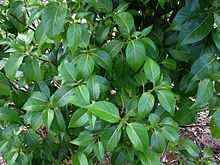Bobea sandwicensis
From Wikipedia, the free encyclopedia
| ʻAhakea | |
|---|---|
 | |
| Conservation status | |
| Scientific classification | |
| Kingdom: | Plantae |
| (unranked): | Angiosperms |
| (unranked): | Eudicots |
| (unranked): | Asterids |
| Order: | Gentianales |
| Family: | Rubiaceae |
| Genus: | Bobea |
| Species: | B. sandwicensis |
| Binomial name | |
| Bobea sandwicensis (A.Gray) Hillebr. | |
ʻAhakea or Hawaiʻi Dogweed (Bobea sandwicensis) is a species of flowering tree in the coffee family, Rubiaceae, that is endemic to Hawaiʻi. It inhabits lava plains as well as dry, coastal mesic and mixed mesic forests at elevations of 100–1,220 metres (330–4,000 ft) on the islands of Oʻahu, Molokaʻi, Lānaʻi, and Maui.[1] It is threatened both by habitat loss and competition from invasive species.
References
- ↑ "ahakea, ahakea lau lii (B. brevipes), akupa (B. brevipes), ahakea lau nui (B. elatior)". Hawaiian Ethnobotany Online Database. Bernice P. Bishop Museum. Retrieved 2009-03-24.
- Bruegmann, M.M. & Caraway, V. 2003. Bobea sandwicensis. 2006 IUCN Red List of Threatened Species. Downloaded on 20 August 2007.
External links
- Little Jr., Elbert L.; Roger G. Skolmen (1989). ʻAhakea (PDF). United States Forest Service.
This article is issued from Wikipedia. The text is available under the Creative Commons Attribution/Share Alike; additional terms may apply for the media files.
